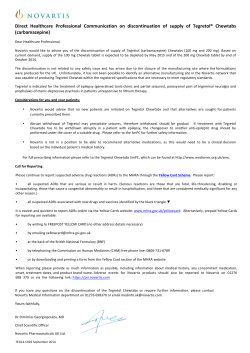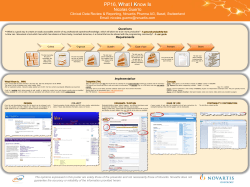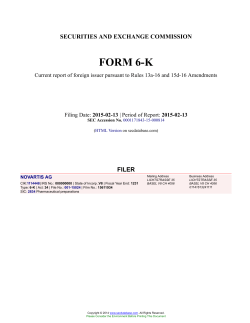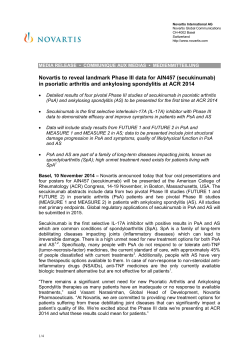
Lucentis (ranibizumab) approved by Health Canada to treat vision
Novartis Pharmaceuticals Canada Inc. 385 Bouchard Blvd. Dorval, Quebec Canada H9S 1A9 www.novartis.ca MEDIA RELEASE • MEDIA RELEASE • MEDIA RELEASE Pr Lucentis® (ranibizumab) approved by Health Canada to treat vision loss resulting from choroidal neovascularization in pathologic myopia (mCNV)1 Fourth indication for injection treatment that can stabilize and improve vision1 mCNV a leading cause of visual impairment among those 20–50 years of age9 Since its launch in Canada in 2007, Lucentis® has treated more than 100,000 eyes across all approved indications3 Dorval, Quebec, October 8, 2014 – Novartis Pharmaceuticals Canada Inc. announced today that Lucentis® (ranibizumab), the treatment for several major causes of vision loss, has been approved by Health Canada for the treatment of visual impairment due to choroidal neovascularization (CNV) secondary to pathologic myopia (myopic CNV).1 Myopic CNV (mCNV) develops in 5–10% of patients with pathologic myopia,4 which is a leading cause of blindness in many developed countries5 and second only to wet agerelated macular degeneration in causing CNV.8 Abnormal blood vessels form beneath the retina of the eye and can rupture, leaking blood and fluid into the retina, causing vision loss.6 It is estimated that every day, almost five Canadians start experiencing vision loss from mCNV.7 In patients with untreated mCNV the long-term prognosis is poor, with approximately 90 per cent developing severe vision loss after five years.10 The condition is more than twice as prevalent in Asian populations as European populations.6 “The thought of losing your vision can be devastating and the patients I see with this condition are generally young, healthy adults who are working and have a bright future before them. The approval of Lucentis® for mCNV equips us as physicians because until now we were only able to slow down vision loss in these patients,” said Dr. David Wong, Ophthalmologist-in-Chief at St. Michael’s Hospital in Toronto. “Improving vision in these patients allows them to continue working and get on with their busy lives.” Lucentis® is an inhibitor of vascular endothelial growth factor (VEGF), one of the key elements in the formation of new and abnormal blood vessels beneath the retina which cause vision loss associated with both mCNV6 and the more prevalent condition of wet age-related macular degeneration (AMD).1,11 Treatment of vision loss from mCNV with Lucentis® starts with a single injection, with further injections as needed based on disease activity, which is monitored monthly for the first two months then at least quarterly for up to one year. After the first year, frequency of monitoring is at the discretion of the treating physician.1 When 67-year-old Harry Tiefenbach of Toronto started losing vision from mCNV, he knew it would have devastating effects. “My vision started blurring all the time and was distorted. I’m an artist and painting is my life. I prepared for the worst but did not know how I would pick up the pieces after losing my vision,” he said. “When my doctor first told me about Lucentis®, I had hope. Soon after my first injection, my vision started improving. Today, I’m still painting and doing all the things I want to do. It’s made a big difference in my life and for my family.” Page 1 of 3 The Phase III study on which the approval of the new indication was based, showed that treatment with Lucentis® was superior to the previous standard of care, Visudyne® (verteporfin PDT).1 Lucentis® improved mean visual acuity by about 14 letters (on an eye chart) after one year. This result was achieved with a median of two injections over the 12 months. Over 60 per cent of patients in the trial did not need any further injections after six months. Previous treatments for mCNV aimed to stabilize vision but generally did not improve visual acuity.1,8 About Lucentis® Lucentis® (ranibizumab) was specifically designed for use in the eye and is administered by injection into the eye. It is licensed in more than 40 countries for the treatment of visual impairment due to mCNV.3 It was first approved by Health Canada in 2007 for the treatment of wet age-related macular degeneration (AMD) and is available through the public health plans of all 10 provinces to treat that disease. It is also approved in Canada for the treatment of visual impairment due to diabetic macular edema (DME) and visual impairment due to macular edema secondary to retinal vein occlusion (RVO).1 About Novartis Pharmaceuticals Canada Inc. Novartis Pharmaceuticals Canada Inc., a leader in the healthcare field, is committed to the discovery, development and marketing of innovative products to improve the wellbeing of all Canadians. In 2013, the company invested close to $100 million in research and development in Canada. Novartis Pharmaceuticals Canada Inc. employs more than 600 people in Canada. For further information, please consult www.novartis.ca. About Novartis Novartis provides innovative healthcare solutions that address the evolving needs of patients and societies. Headquartered in Basel, Switzerland, Novartis offers a diversified portfolio to best meet these needs: innovative medicines, eye care, cost-saving generic pharmaceuticals, preventive vaccines, over-the-counter and animal health products. Novartis is the only global company with leading positions in these areas. In 2013, the Group achieved net sales of USD 57.9 billion, while R&D throughout the Group amounted to approximately USD 9.9 billion (USD 9.6 billion excluding impairment and amortization charges). Novartis Group companies employ approximately 135,000 fulltime-equivalent associates and sell products in more than 150 countries around the world. For more information, please visit www.novartis.com. ### ® Lucentis is a registered trademark of Genentech Inc., used with permission by Novartis Pharmaceuticals Canada Inc. ® Visudyne is a registered trademark of Novartis Pharmaceuticals Canada Inc. Novartis Media Relations Julie Schneiderman Novartis Pharmaceuticals Canada Inc. +1 514 633-7873 camlph.communications@novartis.com References: 1. Lucentis® Product Monograph. Novartis Pharmaceuticals Canada Inc., May 28, 2014. 2. Silva R. Myopic maculopathy: a review. Ophthalmologica 2012; 228(4):197-213. 3. Data on file. Novartis Pharmaceuticals Canada Inc. 4. Nguyen JK, Jeffrey SH. Chapter 23:Choroidal neovascularization secondary to inflammation, infection, and myopia. In: Nguyen QD, Rodrigues EB, Farah ME, Mieler WF, eds. Retinal Pharmacotherapy. USA: Saunders Elsevier; 2010. Page 2 of 3 5. Ohno-Matsui K, Yoshida T, Futagami S et al. Patchy atrophy and lacquer cracks predispose to the development of choroidal neovascularisation in pathological myopia. Br J Ophthalmol 2003; 87: 570-3. 6. Wong TY, Ferreira A, Hughes R et al. Epidemiology and disease burden of pathologic myopia and myopic choroidal neovascularization: an evidence-based systematic review. Am J Ophthalmol 2014; 157(1): 9-25.e12. 7. Canadian annual incidence of 0.0061% from Pickering M, Luciani L, Zaour N et al. Prevalence, incidence and characteristics of patients with choroidal neovascularization secondary to pathologic myopia in a representative Canadian cohort. Association for Research in Vision and Ophthalmology (abstract) 2014 applied to Canadian 2013 adult (20+) population of 27,305,200 = 1638.3 new cases per year in Canada. Population data from Statistics Canada, Population by sex and age group 2013, CANSIM Table 051-0001, accessed at: http://www.statcan.gc.ca/tables-tableaux/sum-som/l01/cst01/demo10a-eng.htm 8. Neelam K, Cheung CMG, Ohno-Matsui K et al. Choroidal neovascularization in pathological myopia. Prog Retin Eye Res 2012; 31(5): 495-525. 9. Mones JM, et al. Intravitreal ranibizumab for choroidal neovascularization secondary to pathologic myopia: 12-month results. Eye. 2009;23:1275-1281. 10. Yoshida T, Ohno-Matsui K, Yasuzumi K et al. Myopic Choroidal Neovascularization: A 10-year Follow-up, Ophthalmology 2003;110:1297-1305. 11. CNIB, Treatments for Wet AMD, accessed Aug. 13, 2014 at: http://www.cnib.ca/en/your-eyes/eye-conditions/amd/treatment/treatmentwet/Pages/default.aspx Page 3 of 3
© Copyright 2025



















